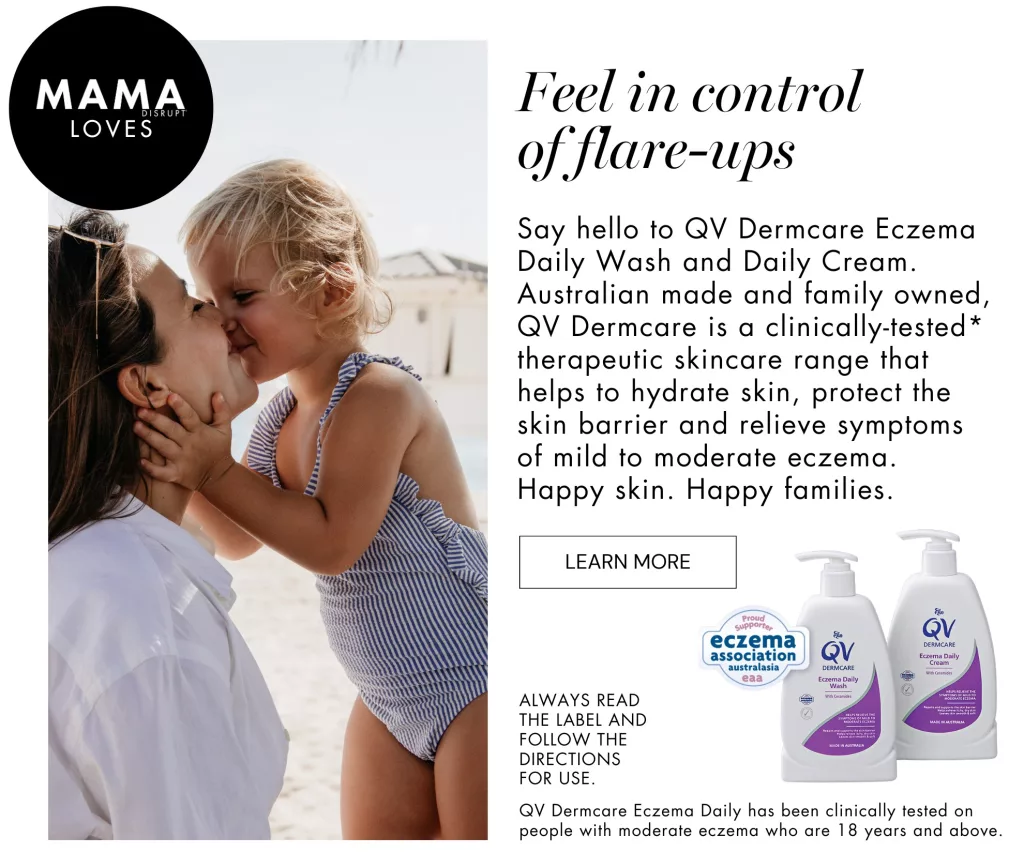POWERED BY QV SKINCARE
When you have eczema, life can be such a b*tch. But it doesn’t have to be.
This feature is Part 1 of our Healthy Skin Series in partnership with Ego Pharmaceuticals, sharing insider skincare secrets to help you and your family feel happier and healthier this season. Read Part 2 here, Part 3 here, and sign up to our newsletter for more.
Motherhood is a wild ride, right? Between the laughter, the mess, the big emotions, the cuddles, there’s also the stuff that no one really prepares us for – like when our family is dealing with skin issues.
As mamas, we want the best for our family. So when eczema gets irritated, it can cause a lot of distress. Because having a family member suffer from eczema can be deeply challenging. Seeing their discomfort, the constant itch, not to mention the sleepless nights – it is emotionally taxing. Then there’s the endless specialist appointments, searching for triggers, and researching soothing creams.
So, let us help you tackle this itchy issue head-on.
This isn’t just another lecture babe, it’s an empowering journey of knowledge. Breaking down the science, the myths, and everything in between. We want to arm you with the tools and insights you need to take control, so you can kiss those red, itchy patches goodbye.
“HAVING A FAMILY MEMBER SUFFER FROM ECZEMA CAN BE DEEPLY CHALLENGING. SEEING THEIR DISCOMFORT, THE CONSTANT ITCH, NOT TO MENTION THE SLEEPLESS NIGHTS – IT IS EMOTIONALLY TAXING.”

What is eczema?
Eczema [also known as atopic dermatitis] is a skin condition where the skin becomes dry, scaly and itchy. It can start at any age, but is most common in children – it actually affects 30% of infants, with 95% most commonly diagnosed before they turn five.
Sometimes there can be a family history or a link to other issues, like hayfever, asthma and food allergies. Or it can be caused by a variety of triggers, the most common being heat, grass, wool, soaps and detergents. And sometimes, despite our best detective efforts, we never pinpoint the exact culprit. But the good news is, many children outgrow it eventually.
Now depending on the severity of the eczema, it may look different for everyone, but here are some of the key symptoms of eczema:
- Patches of red and inflamed skin on the body, such as elbows or knees
- Dry skin
- Itchy skin
- Skin rashes

Eczema myths busted
Myth #1: Eczema is contagious
Fact: Childhood eczema is actually not contagious, and children with eczema don’t need to be isolated during a flare-up. But it’s important to know that dry and cracked eczema-affected skin can be more prone to secondary bacterial or viral skin infections. So keep affected kids away from anyone with cold sores or infected wounds. You can’t be too careful.
Myth #2: Eczema will go away on its own
Fact: While it’s true that some children can and will grow out of it when their skin matures, around 10% of people will continue to suffer from eczema into adulthood. Right now, there is no actual cure for eczema, however management is possible.
Myth #3: Eczema is not hereditary
Fact: Experts have found that eczema is hereditary. They believe that mutated genes passed on from a parent may control and increase the likelihood for eczema. But, the gene may only be noticed when the child is exposed to a trigger and a flare-up occurs.
Myth #4: You can only develop eczema on the face and hands
Fact: Childhood eczema can affect any part of the body. Babies with eczema usually have red rashes on their faces, but they can also get it on their scalp, behind the ears and on their bodies. Toddlers and pre-schoolers tend to be more affected in the skin creases around the knees, wrists, elbows and ankles.

How to know your triggers and avoid eczema flare-ups
The world around us is riddled with potential triggers – allergens and environmental factors – which can fire up the immune system and send it into overdrive. The result? Red flags in the form of inflammation and an itch that just won’t quit. Common triggers include:
Hot temperatures and overheating skin: Layer clothing for easy removal so you can keep the skin cool. We recommend wearing cotton clothing.
Perfumed products and contact with irritants: This includes detergents, soaps, and chlorinated pools. We recommend using soap-free and fragrance-free products such as QV Dermcare, which is made especially for eczema-prone skin. Always read the label and follow the directions for use.
Dust and dust mites, and pet fur: Along with keeping your home as clean as you can to reduce dust, air purifiers will maintain a cool, dry environment. And for peeps with pets, the best you can do is try to cut down contact with your fur babies.

How to treat eczema
Don’t go it alone. Make sure you have a healthcare professional in your corner. Someone such as a GP or dermatologist, who can help you put together an eczema management plan. This will include two tried and tested strategies:
1. Identify and avoid triggers
Just as things like dust and pollen can turn hay fever into a sneeze fest, some allergens and environmental factors [like the ones we mentioned above] will trigger eczema flare-ups.
“It’s important to be aware of these triggers and watch for any others that might be affecting you or your child. One way to do this is to use a symptom diary, where you can record when and where symptoms occur. This can make it easier to spot patterns or triggers in your or your child’s diet or environment, it’s ideal to share this with your medical practitioner,” says Ian Harrison, head of Ego’s Scientific Communications and Clinical Trials team.
2. Moisturise, moisturise, moisturise
Even when someone’s eczema skin looks normal [read: is not red or inflamed] they may still have a weakened skin barrier – which is responsible for keeping water in and irritants out.
Ian explains it like this: “Just like a bucket with holes in the bottom, eczematous skin will lose water more quickly than normal skin and is often bordering dryness and irritation. Similarly, the incessant itch associated with eczema can be made worse by dry skin.”
So give the skin barrier extra love and attention by making sure it is hydrated all. the. time.
That is why the strong foundation of any eczema management plan needs to include regular use of moisturisers. But not just any moisturiser, one that is specifically made for eczema skin. The QV Dermcare range is a golden go-to for use on mild to moderate eczema skin and it can significantly improve the skin barrier function in just 28 days*. Always read the label and follow the directions for use.
*Spada F, Harrison IP, Barnes TM, Greive KA, Daniels D, Townley JP, et al. A daily regimen of a ceramide-dominant moisturizing cream and cleanser restores the skin permeability barrier in adults with moderate eczema: A randomized trial. Dermatol Ther. 2021;34(4):e14970.

A-Z of good ingredients
As mothers, we always want to look after our family’s skin. This is even more important when there is a skin condition, such as eczema. And with sooo many products on the market, loaded with all sorts of things, it can be really confusing to know what we should and shouldn’t be putting on their skin.
Mama, knowing and understanding the ingredients in certain skincare really is a recipe for success.
Ceramides: For skin barrier support and moisture retention in sensitive skin.
Dimethicone: Protects the skin by making a water-repellent barrier against water soluble irritants.
Lactic Acid: Helps to remove dead outer skin while improving skin moisture.
Panthenol: Also known as Pro Vitamin B5, it helps to improve skin hydration and reduce water-loss for extra softness and elasticity.
Paraffinum Liquidum: Reduces moisture loss from the outermost layer of the skin to keep it nice and hydrated.
Squalane: Works as a vehicle to help carry other substances or ingredients across the skin. Doesn’t sound like much, but trust us, it’s important.
Tocopherol: Also known as Vitamin E, it repairs, protects and smooths sensitive skin.
Zinc Oxide: Forms a protective barrier on the skin and helps lessen the effects of bacteria and other irritants. It also has antibacterial properties and soothes irritated skin.
Eczema may be a battle, but you are a warrior. So know the triggers, lather up, and give flare-ups the finger. Take back control, babe. You’ve got this!
This feature is Part 1 of our Healthy Skin Series in partnership with Ego Pharmaceuticals, sharing insider skincare secrets to help you and your family feel happier and healthier this season. Sign up to our newsletter for more.
Disclaimer: No material on this site is intended to be a substitute for professional medical or health advice, diagnosis or treatment. Always seek the guidance of your doctor or other qualified health professional. Please refer to our Medical and Health Disclaimer for further information.





